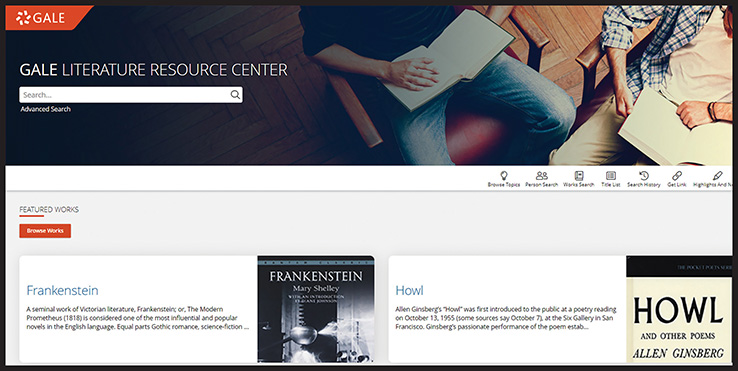Gale Literature Resource Center | eReview
This database includes intuitive tools that help students learn how to approach literary works, make assessments, and formulate arguments.
Gale Literature Resource Center
CONTENT With a range of intuitive tools for emerging researchers, Gale’s significantly updated Literature Resource Center helps users learn how to analyze, conceptualize, and build upon primary source documents. Targeted toward upper-level high school and college students, this resource offers literature-based content hubs that provide avenues for further inquiry and study. The database features over 175,000 entries, including over 80,000 full-text critical essays from proprietary Gale titles; over 2.6 million full-text articles, critical essays, and reviews; and over 175,000 audio and video files. The collection is enhanced through integration with Gale College Collection, a resource that was formerly only available through Cengage MindTap courses.
Literary works represented in the database range from canonical texts to lesser-known titles, stretching back to classical times and up through the modern day. Gale notes that over 50 percent of the works are written by traditionally underrepresented authors. Among the literary works are The Odyssey, Hamlet, The Red Convertible, Gulliver’s Travels, Animal Farm, The Absolutely True Diary of a Part-Time Indian, The Brief Wondrous Life of Oscar Wao, Frankenstein, Invisible Man, and Fences.
USABILITY The resource is extraordinarily well laid out, with a prominent search bar at the top and easy access to the “Featured Works” and “Featured Topics” sections below. The content hubs allow researchers to search for specific titles or topics or browse comprehensive listings.
Curated works pages provide a wealth of information: bibliographic data, a detailed introduction to the work, and links to related content such as literary criticism, author biographies, reviews, news, multimedia content. Overviews of each of the works are carefully crafted, with a detailed introduction, plot summary, character list, and more. All suggested secondary sources are fully referenced, listing authors, dates, word count, peer-review status, and keywords. Users can browse the suggested resources or conduct targeted searches through the search bar. Topic pages are wide-ranging, covering everything from epistolary novels to presidential memoirs to imperialism, naturalism, humor, and exile. Works in the public domain are available to read in their entirety, while other works allow limited access through excerpts.
Citation tools allow students to save citations in MLA, APA, Chicago, and Harvard styles or export to Noodle Tools, EasyBib, RefWorks, Google Drive, or OneDrive. Searches can be saved or printed, and results can be filtered by subject, author, title, publication, and document type. Gale’s topic finder and term frequency tools make it possible to discover related topics or view search results over time.
PRICING Academic library subscription pricing for Gale Literature Resource Center starts at $12,953 annually and is based on an institution’s full-time enrollment and other institutional variables. Public library pricing is based on population served and starts at $3,000 annually. Potential customers should contact their Gale representative for the most current pricing and for consortial purchase information. A free trial for the product can be requested at gale.com/c/literature-resource-center.
VERDICT This outstanding database helps students learn how to approach literary works, become familiar with related tools and sources, formulate arguments, and make assessments. It is an essential resource for any undergraduate library and larger public libraries supporting students in literature and the humanities.
Add Comment :-
RELATED
ALREADY A SUBSCRIBER? LOG IN
We are currently offering this content for free. Sign up now to activate your personal profile, where you can save articles for future viewing









